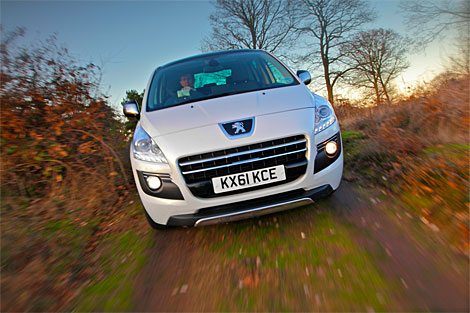Hybrid cars usually combine a petrol engine and an electric motor, in an attempt to have the best of two worlds. The electric motor provides low-noise, low-emission running in town, the petrol engine makes long-distance driving possible and refuelling simple, and the two work together to provide a good blend of performance and economy. But Peugeot’s entry into the hybrid market is a little different, because it uses a diesel engine.
In dealer-speak the 3008 is a ‘crossover’, a car that occupies the gap between an estate car and an SUV, providing decent road manners and spacious accommodation in a tallish, 4x4-style body. In Hybrid4 form there is a 2.0-litre, 163ps diesel driving the 3008’s front wheels (through a rather clunky six-speed automated manual gearbox) and the engine also powers a generator which charges a battery which can drive the rear wheels. Diesel and electric can be used simultaneously for extra power and four wheel drive.
In its default 'Auto' mode the Hybrid4 uses electric power at low speeds and switches to diesel when more power is needed or the battery is depleted. Switching between the modes is seamless, and the diesel engine starts quickly and quietly when needed. A power flow display screen and power demand meter shows what's going on.
A control knob on the centre console provides three other modes: 'ZEV' concentrates on electric power and delays use of the diesel engine as long as possible, 'Sport' uses shift points higher in the rev range and quickens gearshifts, and '4WD' uses both drive systems to provide four wheel drive – though only at low speeds.
The combination of an electric motor, battery, and diesel engine should result in high efficiency, low fuel consumption and low CO2 emissions, and Peugeot claims some startling numbers: 74.4mpg on the official fuel consumption test, and 104g/km of CO2 (there's a 'low emission' version with low rolling resistance tyres on 16in wheels, which returns 99g/km). The Hybrid4 is also a tax-efficient company car choice, because it is classed as a hybrid not a diesel and attracts a lower Benefit in Kind tax rate (10% instead of 13%) which would save a higher-rate taxpayer around £1000 a year.
But the Hybrid4 does cost around £4000 more than an equivalent diesel 3008, and even with today’s inflated prices that buys a lot of fuel. For private buyers a diesel 3008 is probably a better buy.
